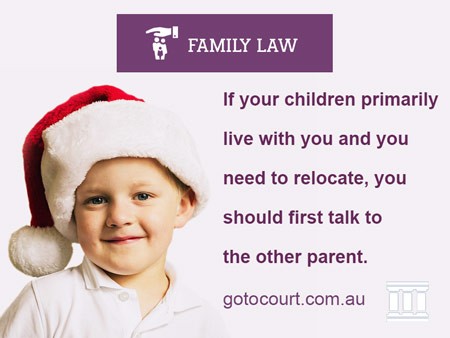Call our lawyers
now
or,
have our lawyers
call you
Relocation Orders
Updated on Nov 08, 2022 • 5 min read • 877 views • Copy Link
Relocation Orders
Under the Family Law Act, moving the children to another town, city, state or country is known as relocation. If a parent moving will limit the time the children get to live with or spend with the other parent or another significant person in their lives, a court may not give permission by way of Relocation Orders. If your children primarily live with you and you need to relocate, you should first talk to the other parent. You may be able to reach agreement that the children spend longer periods of time in school holidays or have longer visits at other times during the year with their other parent.
If you can agree, it is best to enter into a written parenting plan or to apply to the court for consent orders before you move. If you move without a court order or without the consent of the other party, a court may order you to return until it has considered the case. If there are relocation orders in place, moving may breach the order and the other parent may apply to enforce the order.
Court relocation orders
Either parent can apply to the court for an order. The relocating parent can ask the court for a relocation order. The other parent can ask for an order to stop the relocation of the children. The relocating parent must show the court good reasons as to why the relocation orders will be in the ‘best interests of the child‘. The further away it is intended to move, the less likely that the court will agree that it is in the child’s best interests, as contact with the other parent is likely to be much less frequent.
The Court will balance the rights of the relocating parent with the following considerations, while bearing in mind that the final decision must be what is in the best interests of the child:
- the child’s interests in having a meaningful relationship with both parents
- protecting the child from physiological or psychological harm or from being subjected to or exposed to, abuse, neglect or family violence
- the child’s views
- the nature of the child’s relationship with the parents, and others such as grandparents
- whether the parents are willing and able to facilitate and encourage a relationship between the child and the other parent
- how the changes are likely to effect the child’s circumstances
- maturity, sex, lifestyle and background of the parents and the child
- any incidences of family violence
- anything else the court considers is relevant.
Order permitting a child to travel internationally
Every time a parent wishes to take the children overseas they must get the other parent’s permission. An Australian passport can only be issued for a child with the written consent of each person who has parental responsibility for a child.
If you are planning an overseas holiday you should tell the other parent (and any other person with parental responsibility) as soon as possible. You should give them full details of where you will go and include contact numbers.
If written consent is given by all parties with parental responsibility, a passport application can be lodged as normal. If it is not, you can make a written request to the Approved Senior Officer of the Department of Foreign Affairs and Trade to consider issuing the passport due to special circumstances. If they refuse you can apply to the Court for an order permitting a child to travel internationally.
The Court will only allow the child to travel internationally if it decides it is in the best interests of the child.
Preventing a child going overseas
If you are concerned that a child may be taken out of the country, you can:
- Prevent a passport being issued for a child by lodging a Child Alert Request at any Australian Passport Office. If a child alert is in force (they last 12 months) and an application for an Australian passport is received you will be notified. It does not stop a child leaving Australia on a valid passport, and does not affect a passport issued by another country
- Apply to the Court for a child alert order. A court ordered child alert stays in force until a child turns 18, or as directed by the Court. A child alert does not stop a child leaving Australia on a valid passport, and does not affect a passport issued by another country.
- Apply to the court for an order requiring a person to deliver a child’s or accompanying adult’s passport to the Court.
- Apply for an order preventing a child from leaving Australia. This can include a request that the Australian Federal Police (AFP) place the child’s name on the Airport Watch List. The child’s name will stay on the Airport Watch List until a further order of the Court. If you agree to a child going overseas in the future or wish to take a child out of Australia yourself, you must apply to the Court (before you travel) to have the child’s name removed from the Airport Watch List. If you don’t, the child will be prevented from leaving irrespective of who they are travelling with. The AFP won’t remove the child from the list without an order of the Court.

Affordable Lawyers
Our Go To Court Lawyers will assist you in all areas of law. We specialise in providing legal advice urgently – at the time when you need it most. If you need a lawyer right now, today, we can help you – no matter where you are in Australia.How It Works







1. You speak directly to a lawyer
When you call the Go To Court Legal Hotline, you will be connected directly to a lawyer, every time.


2. Get your legal situation assessed
We determine the best way forward in your legal matter, free of charge. If you want to go ahead and book a face-to-face appointment, we will connect you with a specialist in your local area.


3. We arrange everything as needed
If you want to go ahead and book a fact-to-face appointment, we will connect you with a specialist in your local area no matter where you are and even at very short notice.

























